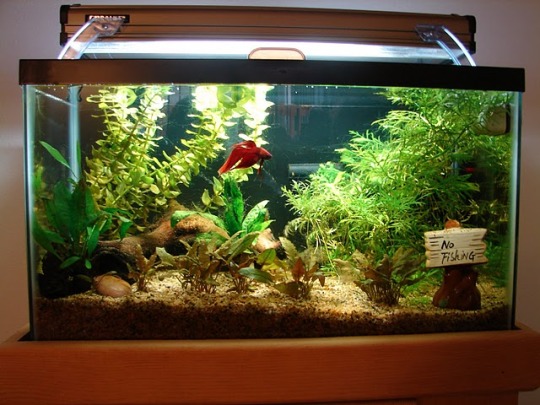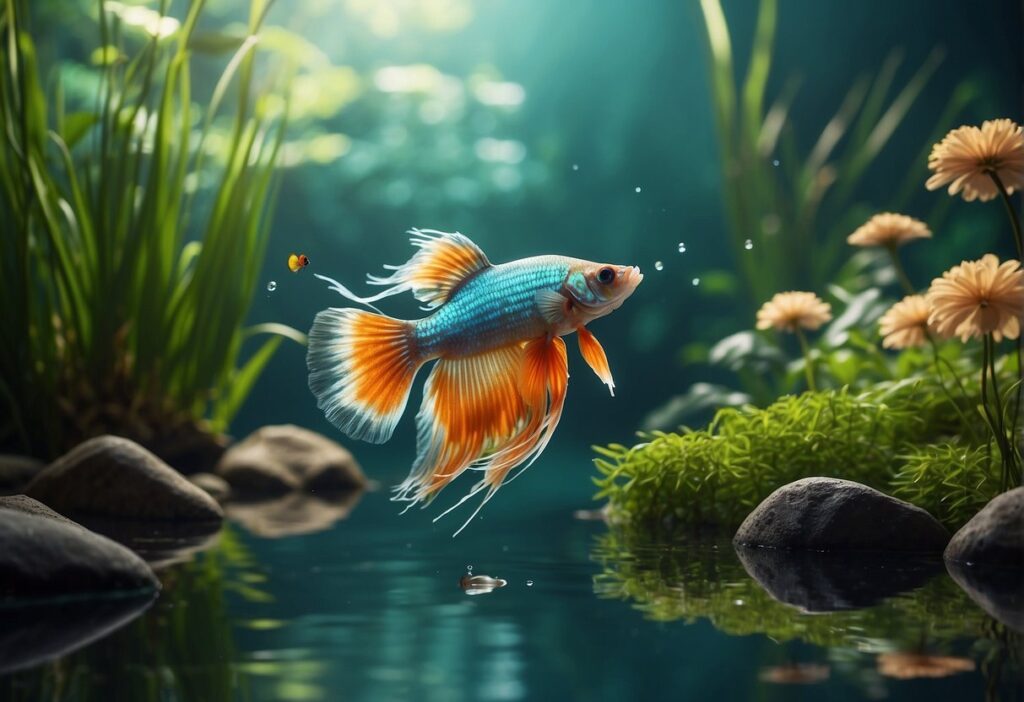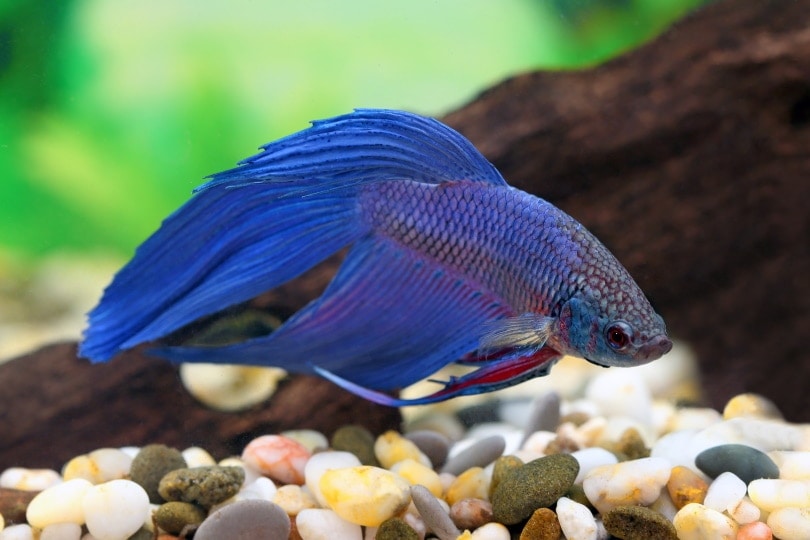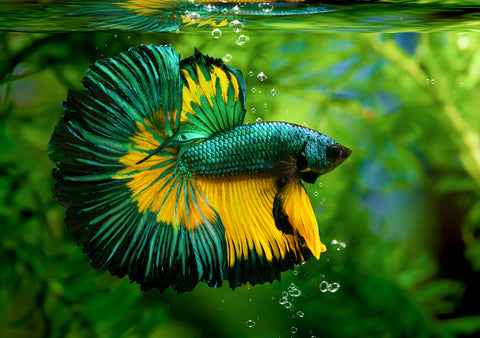Understanding the needs and preferences of betta fish when it comes to their tank is crucial for providing them a thriving and comfortable environment. In this article, we will explore the various aspects that bettas like in their tank and how you can create an ideal habitat for them.

Creating the Ideal Habitat for Betta Fish
When it comes to the tank size and shape, bettas require a minimum of 5 gallons, but ideally, a larger 10-gallon tank is recommended. This allows them ample space to swim and explore their surroundings. Additionally, a tank with a filter and heater is essential for maintaining optimal water conditions for bettas.
Water conditions play a significant role in the well-being of betta fish. They prefer slightly acidic to neutral water with a pH level of around 6.5 – 7.5. It’s important to regularly monitor the water quality using a test kit and make necessary adjustments.
In terms of filtration and oxygenation, bettas thrive in tanks with gentle water flow. A sponge filter or a filter with adjustable settings is ideal to provide a moderate level of filtration without causing too much disturbance in the tank. This allows the bettas to swim comfortably without struggling against strong currents.

Maintaining the right temperature and lighting is crucial for betta fish. They prefer tropical temperatures between 76°F – 82°F (24°C – 28°C). It’s recommended to use a heater to maintain a consistent temperature. For lighting, bettas prefer dim or subdued lighting, so providing a low-intensity light source or utilizing live plants can create a perfect ambiance for them.
Betta fish enjoy a well-decorated tank with suitable decorations. Opt for live plants rather than plastic ones as they not only enhance the aesthetics but also provide hiding spots and natural enrichment. However, if you choose to use plastic plants, make sure they are soft and do not have sharp edges that can damage their delicate fins.
Providing the Right Substrate for Betta Fish
When selecting a substrate for your betta fish tank, it’s important to consider their preferences and safety. Bettas prefer a fine-grained substrate like sand or gravel. Avoid using sharp or rough gravel that may injure their delicate fins. Additionally, make sure to rinse the substrate thoroughly before adding it to the tank to remove any dust or debris.

Tank Light
A proper tank light is essential for a betta fish tank setup. It enhances the tank’s appearance and keeps your betta fish happy and healthy.
For male bettas, a soft, adjustable light mimics their natural habitat. Combine artificial plants with good lighting to create a vibrant betta aquarium. Regularly using an aquarium test kit ensures water quality, supporting overall betta fish care.
Checkout out article on the best aquarium lights for lighting suggestions.
Places to Hide
Creating places to hide is crucial for your betta fish. Male bettas appreciate hiding spots made from artificial plants and decorations, which reduce stress and aggression.
This setup enhances betta fish care by providing security and enrichment. When keeping other fish in the same tank, these hiding spots help maintain peace and keep your betta fish happy. Such environments are ideal for how betta fish live in nature.
Choosing the Perfect Tankmates for Betta Fish
Betta fish are known for their aggressive nature, so it’s crucial to carefully select tankmates to avoid conflicts. Introducing peaceful and compatible species like snails or small shrimp can create a harmonious community tank. However, always monitor their interactions closely and be prepared to separate tankmates if necessary.

Here is a list of a few good tankmate choices:
- Corydoras Catfish: These bottom-dwellers are peaceful and won’t compete with Betta fish for territory.
- Kuhli Loaches: Another bottom-dwelling species, Kuhli loaches are shy and unlikely to disturb Bettas.
- Neon Tetras: Small, colorful, and generally peaceful, they can coexist with Bettas if the tank is large enough.
- Harlequin Rasboras: Known for their calm demeanor, these fish make good tankmates for Bettas.
- Mystery Snails: These snails are good tankmates as they keep to themselves and help clean the tank.
- Freshwater Shrimp: Small and non-aggressive, they can coexist with Bettas, though there’s a risk of them being eaten.
- Ember Tetras: Small, peaceful fish that add a splash of color without bothering Bettas.
- Otocinclus Catfish: These small algae eaters are gentle and spend most of their time on tank surfaces.
- Clown Plecos: Small and peaceful, they are good at cleaning algae and generally leave Betta fish alone.
- Feeder Guppies: These are less colorful than fancy guppies and less likely to provoke aggression from Bettas.
Optimizing Nutrition for Betta Fish
Feeding betta fish a balanced and nutritious diet is essential for their overall well-being. They are carnivorous by nature, so their diet should primarily consist of high-quality betta fish pellets or flakes.
A Low-Flow Filter
A low-flow filter is vital for a betta fish tank setup. Betta fish prefer calm waters, so a gentle aquarium filter prevents stress. It maintains clean water, which is key to betta fish care.
Regularly using an aquarium test kit alongside a low-flow filter ensures a healthy environment in your betta tank. This setup supports betta fish easy living conditions, providing a comprehensive betta fish care guide.
Maintaining Cleanliness and Hygiene in the Betta Fish Tank
Regular maintenance and cleanliness are vital for a healthy betta fish tank. Perform regular partial water changes of about 25% – 50% every week to remove any accumulated toxins or waste. Clean the tank and accessories using a non-toxic aquarium-safe cleaner, ensuring thorough rinsing to remove any residue.
Continuously monitor the water quality using a test kit to maintain optimal conditions. Keep an eye on parameters such as ammonia, nitrite, nitrate levels, and pH. This will help you identify any issues early on and take appropriate measures. A well-maintained tank setup is key to having a happy betta fish.
Ensuring Mental Stimulation for Betta Fish
Betta fish require mental stimulation to prevent boredom and promote their overall well-being. Incorporating hiding places like caves or plants in the tank allows them to have a sense of security and privacy.
Adding aquatic plants not only provides hiding spots but also improves water quality by absorbing nitrates. You can also introduce toys and enrichment items, such as floating objects or a small mirror, to engage them and encourage natural behaviors.

Understanding the Behavioral Traits of Betta Fish
It’s important to understand the natural behavioral traits of betta fish to create a suitable and stress-free environment for them. Betta fish are solitary by nature and prefer to live alone.
They are known to display aggression towards other bettas or fish with similar traits, so individual housing is recommended. Signs of stress in betta fish include loss of appetite, excessive hiding, or frequent flaring. Creating a peaceful and comfortable environment helps alleviate stress and promotes their overall well-being.
Conclusion
In conclusion, betta fish thrive in a well-maintained tank that meets their specific needs and preferences. By providing the right tank size, water conditions, suitable decorations, and a balanced diet, you can ensure a comfortable and thriving environment for your betta fish.
Additionally, understanding their behavioral traits and providing mental stimulation further enhances their overall well-being. Remember to regularly monitor water quality and perform necessary maintenance to keep their tank clean and hygienic. With proper care and attention, your betta fish can lead a healthy and happy life.


